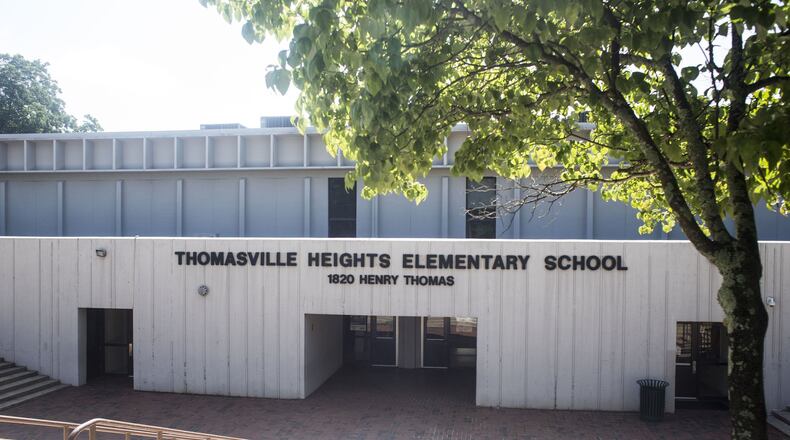Rajanae Jones spent her summer working in a law firm through a Fulton County internship program, but she almost didn’t work at all.
Jones had applied for jobs in retail and at Six Flags Over Georgia, but hadn’t gotten any calls back.
“At that point, I gave up,” the college freshman said.
So she was thrilled to be connected to a pilot program for students at some Atlanta and Fulton schools. Jones was one of nearly 200 students at schools with high dropout rates, or in neighborhoods with high unemployment, who had help finding summer work.
The initiative began after residents complained late last year about a jump in car thefts and other thefts from gas stations in south Fulton and Atlanta. The county's police chief said earlier this year that most of the increase in crime could be attributed to nearly two dozen juvenile offenders.
County officials, interested in ways to prevent other teens from getting caught up in the system, conceived of the internship program as a way to target kids in areas that are often behind. Young adults between the ages of 16 and 24 who live in specific areas with low educational and economic attainment rates were eligible for the program, regardless of their personal circumstances.
Fulton put $1 million toward the internships and to another program that gave grants to 11 organizations that work in local schools and communities to help intervene with students who have poor grades or social issues.
The Truancy Intervention Project received $25,000 in county money, and executive director Jessica Pennington said her group is using the funds to address chronic absenteeism in Thomasville Heights, an elementary school that experiences among the highest rates of truancy in the county. Often, she said, it’s a lack of amenities that causes it — families have substandard housing or poor access to nutrition or transportation, and are more worried about those basic needs than ensuring their children get to school.
Helping with those issues can ensure students get a good education, she said, positioning them well to graduate high school and go on to get jobs.
“What is the impact on their lives?” asked Frankie Atwater, Fulton’s director of community development. “For the kids we did interview, it was impressive.”
Atwater said the internship program aimed to employ as many students as possible, to keep them from having a summer with nothing to do. The grant program is focused on quality of life programs, and prevention, intervention and rehabilitation of at-risk kids.
“It’s the seed for a much larger initiative,” he said. “The hope is that you begin to change the image of that neighborhood and the lives of the individuals in that neighborhood.”
The county paid interns $9 an hour for up to 30 hours a week of work, and paid for their lunch and transportation. Jones, who had never had a job before, said the experience gave her more confidence, and helped her determine that she wants to be a patent lawyer.
Laurie Russell, the human resources manager for the Grand Hyatt Atlanta in Buckhead, had five interns over the summer. They worked in housekeeping, washed dishes, did laundry, fixed equipment and did administrative work at the hotel. Russell said the interns were “really eager, really excited” and they exceeded her expectations.
“It was eye-opening for them,” she said. “For all of them, this was a new exposure.”
The county program included a skills workshop where participants learned how to dress for the office, how to communicate effectively and how to manage conflicts, among other skills.
Alexis McCruter, a senior paralegal at the Dennis Law Firm, who managed Jones, grew up in a single-parent household in south Fulton and said she would have loved to have access to the program when she was in school. She said the internships can help expose students to jobs they didn’t know existed, and can encourage them to work hard. Both McCruter and Jones said they have stayed in touch since Jones left for school, and Jones said McCruter is someone she continues to turn to for advice.
“In the summertime, when there’s idle time, things happen for children,” McCruter said.
Instead of having their summers free, McCruter said, students who participate in the program got access to experiences that might otherwise be unattainable.
“They’re getting things they can’t even pay for,” McCruter said. “They’re getting so much more than they’re even asking for.”
Atwater, with the county, said he hopes he can use the program’s success so far to reach more people in the targeted area, and outside it. The grants will become part of normal county process, with a focus on youth services, he said. And while the county doesn’t yet have statistics on the impact of the programs, Atwater said he hopes to continue learning more about how students are affected by access to work and other programs.
“I think it was a worthwhile investment,” he said. “If we introduce you to the working world, train you, give you support, you have less time to get into trouble.”
ABOUT THE PROGRAM
The internship program targeted people between the ages of 16 and 24 who lived in the geographic areas of 10 Atlanta and Fulton elementary schools that have the greatest need. Those schools are:
Fain
Towns
F.L. Stanton
Thomasville Heights
Boyd
Grove Park
Dunbar
Gideons
Brookview
Dobbs
MYAJC.COM: REAL JOURNALISM. REAL LOCAL IMPACT.
The AJC's Arielle Kass keeps you updated on the latest happenings in Fulton County government and politics. You'll find more on myAJC.com, including these stories:
Never miss a minute of what's happening in Fulton politics. Subscribe to myAJC.com.
About the Author
Keep Reading
The Latest
Featured





